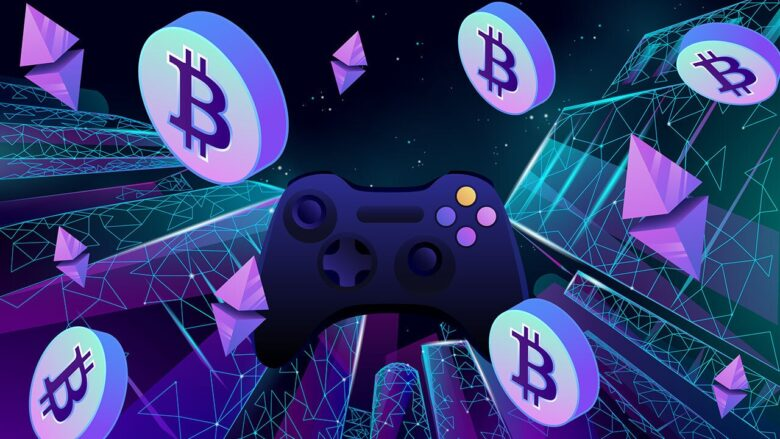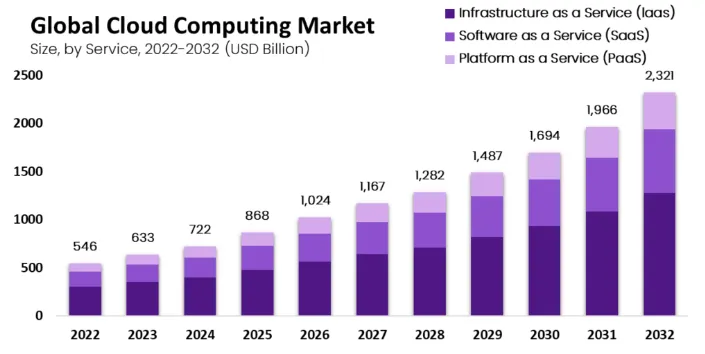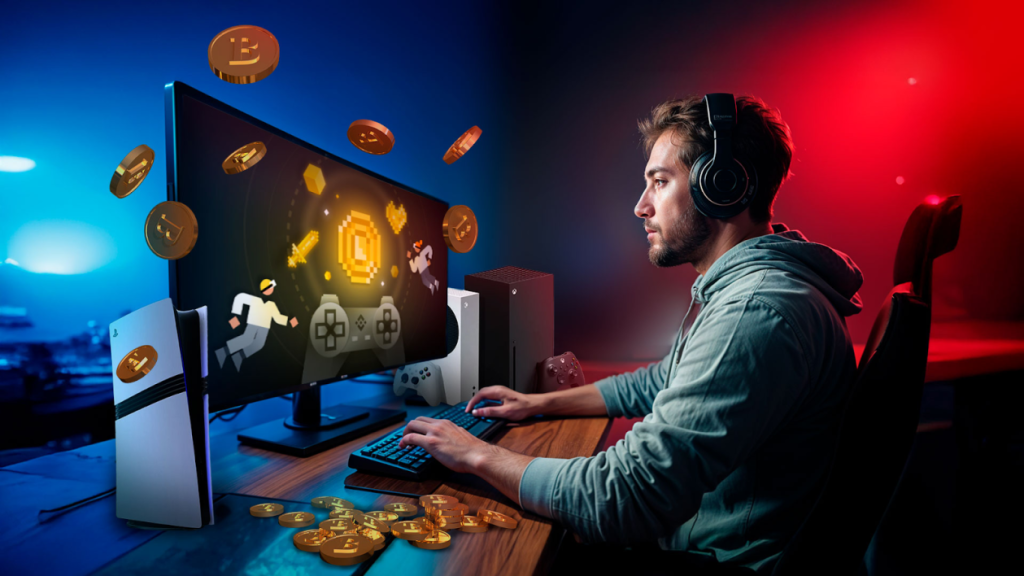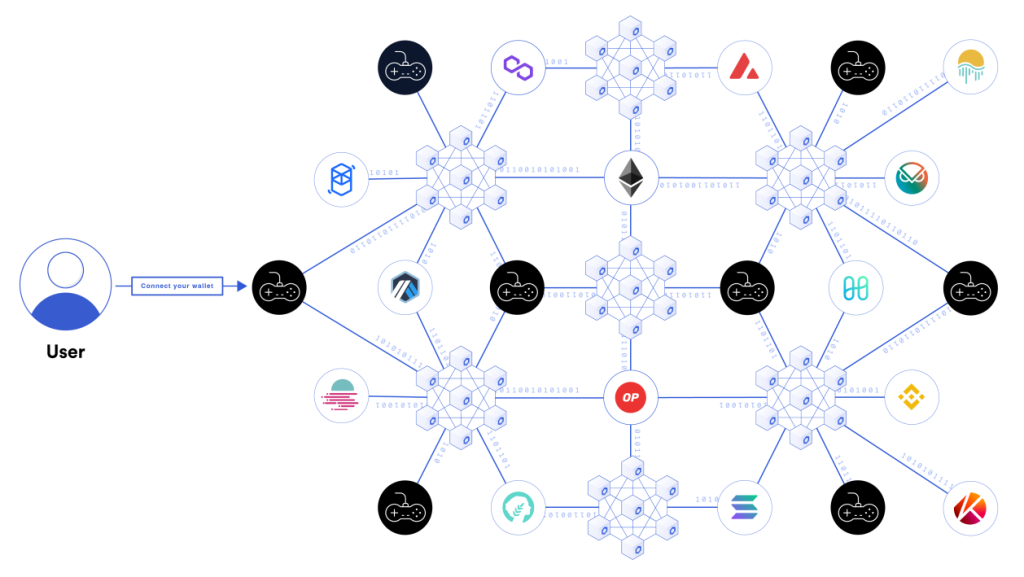How DePIN and Gaming Crypto Are Shaping the Future of Web3 Games
Curious about how DePIN and gaming crypto are connected? DePIN, or Decentralized Physical Infrastructure Networks, leverages blockchain to decentralize game infrastructures. This improves direct transactions, eliminates intermediaries, and enhances the overall gaming experience. In this article, we’ll explain what DePIN is, its benefits for gaming, and the role of blockchain.

Key Takeaways
- DePIN transforms the gaming landscape by enabling decentralized interactions, reducing costs, and enhancing user empowerment through blockchain technology.
- Game developers benefit from lower operational costs and new revenue streams by leveraging DePIN, driving innovation and creativity in game development.
- The future of gaming crypto looks promising with trends like AI integration and expanded network coverage, paving the way for richer and more accessible gaming experiences.
Understanding DePIN in the Context of Gaming
Decentralized Physical Infrastructure Networks (DePIN) represent a paradigm shift in how physical infrastructure is managed and utilized. DePIN projects aim to decentralize physical infrastructure, creating more equitable and resilient networks that support various applications, including gaming. At its core, DePIN enables decentralized and transparent systems that allow users to exchange value without intermediaries, fostering a more inclusive and efficient gaming ecosystem.
The gaming industry stands to benefit immensely from DePIN. DePIN ensures peer-to-peer interactions, allowing direct exchanges between users and improving the overall gaming experience through decentralized networks.
Blockchain technology underpins DePIN, providing the necessary framework for secure transactions and data integrity within the gaming ecosystem. This integration opens up new opportunities for innovation, security, and user empowerment.
What is DePIN?
A Decentralized Physical Infrastructure Network (DePIN) consists of a platform coordinating value transfer and a service delivering value. DePIN projects offer a transparent and secure way to exchange value without intermediaries, utilizing the hallmark goals of blockchain technology, including decentralization of services and the disintermediation of value transfer. Essentially, DePIN refers to a system where blockchain orchestrates activities in the infrastructure layer and supports a peer-to-peer marketplace for service transactions.
These decentralized systems enable users to interact directly, eliminating the need for central authorities and creating a more democratic and efficient infrastructure. The transparency and security provided by blockchain technology further enhance the reliability and trustworthiness of DePIN projects.
How DePIN Operates in Gaming
DePIN operates in the gaming sector by utilizing decentralized networks to enhance the gaming experience. These networks allow direct interaction between service providers and consumers, minimizing the need for expensive centralized servers by tapping into unused computing power from players’ devices. This approach not only reduces costs but also enhances the performance and accessibility of games, allowing gamers to engage from diverse locations without disruptions.
As DePIN projects continue to evolve, they are expected to play a crucial role in the evolution of decentralized gaming. By leveraging blockchain technology, DePIN enhances user engagement and asset ownership, fostering a more robust and interactive gaming ecosystem.
Future advancements in decentralized networks aim to provide a broader audience with wider coverage, resulting in improved performance and accessibility for gamers worldwide through a decentralized wireless network.
The Role of Blockchain Technology in DePIN Projects
Blockchain technology is the backbone of DePIN projects, merging with real-world physical infrastructure to enable community-driven management and governance. By integrating blockchain technology, DePIN projects ensure security, transparency, and efficiency, which are critical for their success. This decentralized approach eliminates the need for central data storage, particularly in gaming, by decentralizing the cloud for gaming purposes.
Furthermore, DePIN allows game developers to tap into decentralized finance, creating opportunities for new income sources through blockchain-enabled services. This integration of blockchain technology ensures that DePIN projects operate smoothly, providing a secure and transparent environment for gamers and developers alike.
The decentralized infrastructure of DePIN represents a significant shift from traditional models, opening up innovative monetization models like play-to-earn.
Enhancing Security Protocols
The decentralized nature of DePIN significantly enhances security protocols by reducing risks linked to centralized data breaches and downtime. A decentralized framework allows users to share resources without a central authority, minimizing hacking risks by eliminating single points of failure and enhancing overall game security. In decentralized gaming ecosystems, resources are managed through smart contracts that automate transactions and ensure transparent operations.
Additionally, decentralized identifiers in gaming reduce the risk of personal information exposure, further enhancing user security. User authentication methods, such as multi-factor authentication, are essential for enhancing security in decentralized gaming platforms.
Storing game data on distributed ledgers enhances security in decentralized gaming, making the ecosystem more resilient to hacks.
Ensuring Transparency and Trust
Blockchain technology ensures transparency and trust in DePIN projects by allowing clear and secure tracking of services and transactions. The decentralized nature of blockchain allows for the transparent recording of transactions, enabling users to verify their integrity independently. This transparency is crucial in fostering trust within decentralized gaming environments.
Moreover, blockchain gaming provides immutable transaction records, ensuring that transaction records cannot be altered, which reduces fraud and fosters trust among users in decentralized gaming environments. The combination of transparent transactions and immutable records cultivates trust within decentralized gaming ecosystems, encouraging more users to participate and invest in these platforms.
Benefits of DePIN for Game Developers
DePIN projects offer numerous benefits for game developers, making them an attractive option in the gaming industry. By leveraging decentralized resources, game developers can significantly reduce their infrastructure costs. This shift towards the depin ecosystem allows for greater player agency and new monetization methods, aligning with the evolving landscape of gaming.
DePIN represents a new frontier in game development, enabling developers to explore innovative funding models and revenue-sharing mechanisms through depin investments.
Lowering Operational Costs
Decentralized infrastructure reduces the expenses typically associated with centralized systems, offering a more cost-effective solution for game developers. DePIN reduces reliance on costly and downtime-prone centralized servers by pooling resources like bandwidth and energy, which are then rewarded with tokens, promoting resource allocation, decentralized contribution, and ownership in a decentralized rates exchange.
YOM’s infrastructure, for example, utilizes a network of distributed gaming machines, facilitating low-cost and low-latency cloud gaming across various devices. The YOM platform allows game developers to focus on creativity by eliminating the need for specialized hardware. This reduction in operational costs enables developers to allocate more resources towards enhancing the gaming experience, creating more engaging and immersive games for players.
New Revenue Streams in Gaming
The gaming sector is witnessing growth in DePIN projects that offer innovative funding models and revenue-sharing mechanisms, offering rewards to participants. Participants in a DePIN can earn rewards in cryptocurrency for their contributions, incentivizing active engagement in the gaming ecosystem. Smart contracts automatically execute agreed terms, ensuring that in-game transactions are processed without manual intervention. The rise of play-to-earn models gives players the ability to earn real money from their gameplay and asset trades, promoting user empowerment.
Digital assets in gaming have transitioned from being purely virtual to holding substantial real-world value, enabling players to monetize their in-game possessions and physical assets. This transition is facilitated by mechanisms like tokenization, which allows for fractional ownership and broader participation in economic activities, contrasting with traditional finance.
Decentralized gaming projects present unique investment avenues due to their potential for player-driven economies in decentralized marketplaces and centralized entities.
DePIN’s Impact on In-Game Assets and Digital Ownership
DePIN enhances player experiences by allowing them to truly own in-game assets, fostering a more engaged and invested gaming community. Integrating in-game assets into a blockchain framework, DePIN enables genuine ownership, allowing players to trade and retain ownership beyond traditional game systems.
This shift empowers users by giving them more control over their digital possessions and enabling them to trade and utilize these items across various sectors and rapidly emerging regulatory landscapes, gaining traction.
Real World Value of Digital Assets
Blockchain’s immutable records prevent any alterations of in-game assets, ensuring that ownership remains clear and verifiable. The traceability of transactions on blockchain enhances accountability, reducing disputes related to in-game economies.
Blockchain technology underpins the creation of real-world value for digital assets by providing immutability and transparency.
Empowering Users with Ownership
The use of decentralized networks empowers users by giving them secure ownership and trade capabilities of in-game assets, moving away from traditional centralized control. Players are increasingly able to secure their in-game assets through decentralized networks, gaining more control over their digital possessions. With DePIN, gamers can trade their in-game assets securely, enhancing user empowerment by giving them full control over their digital possessions.
These advancements signify a major shift towards empowering users through true ownership and trading possibilities in digital gaming environments. This paradigm shift towards decentralized ownership fosters a growing belief in a more engaged and invested gaming community, benefiting both players and developers alike, including in governance decisions, playing a pivotal role in web3 gaming.
Case Studies: Successful DePIN Implementations in Gaming
Real-world examples of successful DePIN implementations highlight the potential of these projects in the gaming industry. YOM, for instance, has collaborated with over 30 game studios, attracting more than 20,000 users on its platform.
Decentralized cloud gaming solutions like YOM can lower barriers to entry for players using low-end devices by enabling high-quality game streaming.
YOM’s Cloud Gaming DePIN
YOM offers the first cloud gaming DePIN solution, which powers white label metaverses, immersive experiences, and games at low prices. YOM’s pixel-streaming infrastructure is optimized for quality, performance, and flexibility, providing studios with tools, grants, and an accelerator program to deploy Unreal Engine 5 experiences.
peaq Network’s High-Speed Transactions
peaq Network can achieve transaction speeds of 10,000 transactions per second, with scalability up to 100,000 transactions per second to accommodate increased demand. The peaq Network provides essential modular functions including data verification, machine ID assignments, data indexing, and access control, making it a prime example of efficient and scalable decentralized infrastructure for gaming.
Challenges and Opportunities in DePIN and Gaming Crypto
DePIN and gaming crypto present both challenges faced and opportunities. Privacy and security concerns are prompting the need for alternative systems in DePIN to address data theft risks.
Factors contributing to the larger market adoption of DePIN include:
- The cost of compute and hardware
- Powerful small nodes
- Improved usability
- Privacy and security concerns
- The maturity of utility token technology
- Expanding societal acceptance of blockchain
Overcoming Security Concerns
Decentralized gaming networks face significant threats such as hacking and data breaches, necessitating robust security protocols. The decentralized approach reduces risks linked to centralized data breaches and downtime, but it also introduces new challenges, including the potential for smart contract vulnerabilities and decentralized identifier exploitation. Implementing multi-factor authentication, regular security audits, and leveraging AI for threat detection can help mitigate these risks, ensuring transparency and security for all participants.
Moreover, blockchain technology provides a decentralized ledger that records all transactions, enhancing data security and helping to overcome challenges related to privacy and security. This transparent nature allows players to audit the history of transactions, fostering trust in decentralized gaming environments and creating opportunities for wider adoption.
Investment Opportunities in DePIN
Venture capital investments in decentralized physical infrastructure networks are increasing, indicating a strong belief in their potential within gaming and other sectors. Innovations in the tokenization of real-world assets (RWAs) are seen as key to attracting investment for DePIN projects, providing a new avenue for investors to engage with decentralized ecosystems. These investment opportunities not only support the growth of DePIN projects but also drive advancements in network coverage and infrastructure development, further enhancing the gaming experience.
The growing interest from investors in DePIN projects underscores the potential for substantial returns, as these projects offer decentralized solutions that align with the broader trends of digital transformation and blockchain integration. This trend is paving the way for more robust and scalable decentralized gaming ecosystems that attract both players and developers.
Future Trends in DePIN and Gaming Crypto
The future of DePIN and gaming crypto is bright, with several exciting trends on the horizon. The integration of artificial intelligence with DePIN can lead to smarter gaming experiences, enabling adaptive gameplay and personalized interactions.
Expanding network coverage is crucial for decentralized gaming, allowing more players to access games and participate in the ecosystem regardless of their geographical location.
Integration with Artificial Intelligence
Integrating AI with DePIN can enhance gaming experiences by enabling personalized content and smarter decision-making in gameplay. AI can analyze player behavior and preferences to create more engaging and tailored gaming experiences. Additionally, AI can assist in the management and delegation of resources within DePIN networks, ensuring optimal performance and efficiency.
Combining AI with DePIN technology can lead to more personalized gaming experiences, enabling real-time decision-making and adaptive gameplay. This integration is anticipated to enhance game design and player interactions, leveraging advanced data analysis and machine learning to create dynamic and immersive gaming environments.
Expanding Network Coverage
The future of network coverage promises to reshape decentralized gaming, enhancing user experiences through improved connectivity and accessibility. YOM’s cloud gaming solution utilizes decentralized infrastructure to enhance gaming experiences, broadening access and reducing latency for players. This expanded coverage allows more players to participate in decentralized gaming ecosystems, regardless of their geographical location.
peaq Network contributes to DePIN projects with high transaction speeds, enabling efficient and scalable solutions for growing gaming networks. Overcoming security concerns remains critical in ensuring the trustworthiness and integrity of decentralized gaming networks, driving further innovation and adoption.
Investment opportunities in DePIN encourage continued advancements in network coverage, ultimately enhancing player engagement and interaction.
Summary
In summary, DePIN and gaming crypto are at the forefront of revolutionizing the Web3 gaming landscape. DePIN projects enable decentralized and transparent systems that enhance security, reduce costs, and create new revenue streams for game developers. By leveraging blockchain technology, DePIN ensures transparency and trust, empowering users with true ownership of in-game assets and fostering a more engaged gaming community.
The future holds exciting possibilities with the integration of AI, expanded network coverage, and innovative investment opportunities. As DePIN continues to evolve, it promises to create more immersive and interactive gaming experiences, benefiting players, developers, and investors alike. The transformative potential of DePIN and gaming crypto is immense, and their impact on the future of gaming is just beginning to unfold.
Frequently Asked Questions
What is DePIN and how does it operate in gaming?
DePIN enhances gaming by enabling decentralized networks for direct peer-to-peer interactions, which creates a more immersive and cost-efficient experience. This innovative approach fosters a vibrant community while reducing reliance on centralized servers.
How does blockchain technology enhance security in DePIN projects?
Blockchain technology significantly enhances security in DePIN projects by utilizing a decentralized framework that minimizes risks of data breaches and downtime. With smart contracts and decentralized identifiers, it automates transactions while safeguarding personal information, ensuring a more secure and reliable environment for users.
What are the benefits of DePIN for game developers?
DePIN empowers game developers by cutting infrastructure costs and unlocking new revenue streams through innovative funding and play-to-earn models. This opens up exciting opportunities for both developers and players alike!
How does DePIN impact in-game assets and digital ownership?
DePIN significantly enhances your gaming experience by granting true ownership of in-game assets through blockchain integration, allowing you to trade and keep your digital possessions. This fosters a more connected and invested gaming community where your contributions truly matter.
What are the future trends in DePIN and gaming crypto?
Expect exciting developments as DePIN integrates artificial intelligence for enhanced gaming experiences, improves connectivity, and opens up innovative investment opportunities in decentralized gaming ecosystems. The future looks bright for gamers and investors alike!










